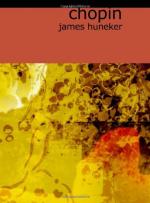[Musical score excerpt]
Although this nocturne is luxuriant in style, it deserves warmer praise than is accorded it. Irregular as its outline is, its troubled lyrism is appealing, is melting, and the A flat portion, with its hesitating, timid accents, has great power of attraction. The E major Nocturne has a bardic ring. Its song is almost declamatory and not at all sentimental—unless so distorted—as Niecks would have us imagine. The intermediate portion is wavering and passionate, like the middle of the F sharp major Nocturne. It shows no decrease in creative vigor or lyrical fancy. The Klindworth version differs from the original, as an examination of the following examples will show, the upper being Chopin’s:
[Musical score excerpt]
The posthumous nocturne in E minor, composed in 1827, is weak and uninteresting. Moreover, it contains some very un-Chopin-like modulations. The recently discovered nocturne in C sharp minor is hardly a treasure trove. It is vague and reminiscent The following note was issued by its London publishers, Ascherberg & Co.:
The first question, suggested by the announcement of a new posthumous composition of Chopin’s, will be “What proof is there of its authenticity?” To musicians and amateurs who cannot recognize the beautiful Nocturne in C sharp minor as indeed the work of Chopin, it may in the first place be pointed out that the original manuscript (of which a facsimile is given on the title-page) is in Chopin’s well-known handwriting, and, secondly, that the composition, which is strikingly characteristic, was at once accepted as the work of Chopin by the distinguished composer and pianist Balakireff, who played it for the first time in public at the Chopin Commemoration Concert, held in the autumn of 1894 at Zelazowa Wola, and afterward at Warsaw. This nocturne was addressed by Chopin to his sister Louise, at Warsaw, in a letter from Paris, and was written soon after the production of the two lovely piano concertos, when Chopin was still a very young man. It contains a quotation from his most admired Concerto in F minor, and a brief reference to the charming song known as the Maiden’s Wish, two of his sister’s favorite melodies. The manuscript of the nocturne was supposed to have been destroyed in the sacking of the Zamojski Palace, at Warsaw, toward the end of the insurrection of 1863, but it was discovered quite recently among papers of various kinds in the possession of a Polish gentleman, a great collector, whose son offered Mr. Polinski the privilege of selecting from such papers. His choice was three manuscripts of Chopin’s, one of them being this nocturne. A letter from Mr. Polinski on the subject of this nocturne is in the possession of Miss Janotha.
Is this the nocturne of which Tausig spoke to his pupil Joseffy as belonging to the Master’s “best period,” or did he refer to the one in E minor?




